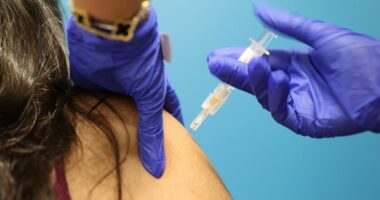Share this @internewscast.com

Manage your sleep, and stress and get some daily exercise.
Polycystic Ovary Syndrome (PCOS) is a hormonal condition that affects women of childbearing age. In this, the ovaries end up producing an abnormal amount of male sex hormones androgens that are usually present in women in small amounts. According to hopkinsmedicine.org, the name ‘polycystic ovary syndrome’ describes the numerous small cysts that form in the ovaries. Its symptoms may include missed, irregular, or light periods; excess body hair, including that on the chest, stomach, and back; weight gain, especially around the belly; acne or oily skin; male-pattern baldness or thinning hair; infertility; dark skin patches on the back of the neck, armpits, and under the breasts.
Recently, Dr Tanaya — who goes by the name of ‘Dr Cuterus’ on Instagram — shared a video, in which she talked about the disorder and how to manage it. Take a look.
The doctor said if you are bothered by the excess amount of hair on your face or body, consider having spearmint tea. “Spearmint tea can reduce the amount of excessive testosterone in your body. [Consuming] 2 to 3 cups a day can help reduce excess hairiness,” she said.
PCOS And The Risk Of Cancer
She warned that PCOS can even increase your risk of cancer. The doctor went on to explain that the endometrium, which is the inner lining of the uterus, is impacted by PCOS. “Your risk of endometrial cancer goes up.”
According to the US National Cancer Institute, in endometrial cancer, malignant cells form in the tissues of the endometrium. Obesity and metabolic syndrome may increase the risk. “But, you can reduce the risk by managing your PCOS,” said Dr Tanaya, adding that birth control pills or hormonal pills help control your risk of endometrial cancer.
PCOS And Diabetes
The third point that she stressed is the fact that PCOS may increase your risk of diabetes. “Make sure you manage your PCOS well under the guidance of a nutritionist, who can help you keep things under control.”
Managing PCOS
The expert also said you do not have to go dairy-free or gluten-free. You can manage the condition by eating a “healthy, varied diet”. “Manage your sleep, and stress and get some daily exercise.”
And finally, the doctor said since there is more testosterone in the body, it is easier to put on muscles.











